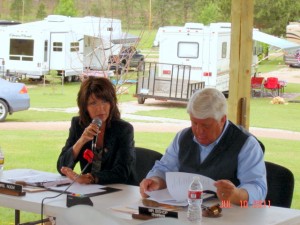I am not sure who chose the venue, but the choice was superb. The backdrop of the hearing was a magnificent vista of the Black Hills of South Dakota. Under bright sunshine and blue skies the red tops of beetle infested trees was visible to the attendees.
 The Subcommittee on National Parks, Forests and Public Lands Chairman Rob Bishop (R-UT) and Congresswoman Kristi Noem (R-SD) were in attendance and were the benefactors of the testimony given by the witnesses.
The Subcommittee on National Parks, Forests and Public Lands Chairman Rob Bishop (R-UT) and Congresswoman Kristi Noem (R-SD) were in attendance and were the benefactors of the testimony given by the witnesses.
The witnesses testifying were:
Craig Bobzien, Supervisor Black Hills National Forest, U.S. Forest Service;
Ray Sowers, State Forester, South Dakota Department of Agriculture;
Nort Johnson, President & CEO Black Hills Badlands & Lakes Association;
Todd George, Owner Rafter J Bar Ranch Campground;
James Scherrer, Business Director Black Hills Orthopedic & Spine Center and Landowner;
Jim Neiman, Vice President/CEO Neiman Enterprises, Inc.
All of the witnesses testified as to the devastating effect that this 14-year outbreak has had on the Black Hills of South Dakota and that with no evidence of any lessening of the epidemic that emergency action by the federal government is absolutely essential.
In just the past year, the infestation has grown from 22,000 acres to 40,000 acres in the Black Hills alone according to the U.S. Forest Service. Mr. Sowers agreed and added that this is the largest and longest outbreak in recorded history.
The Black Hills Badlands & Lakes Association President testified of the impact already felt in tourism and worse the outlook for future impact if emergency action is not taken by the federal government to allow faster action against newly attacked trees.
Rafter J Bar Ranch Campground owner Todd George related how he has been forced to delay the expansion plans for his facility due to the infestation of surrounding trees and the resultant heightened wildfire risk. He has also had to use some of the resources that were planned for use in expanding and improving the campground to remove infested trees and spray others to prevent their infestation.
Mr. James Scherrer related how he has used his personal resources to thin the trees on his property and spray legacy trees in an effort to save them.
All witnesses agreed that the battle against the epidemic is hindered by the U.S. Government’s lack of action and excessive delays in getting approval for the combat of this epidemic on federal lands. Currently it takes 2 years to receive authorization for action and in the interim more and more trees are destroyed and the threat to adjoining state lands or private lands increases.
Mr. Neiman testified as to the effect of this epidemic on the private forestry industry in South Dakota. If the epidemic continues and the delay in removal of infected trees quickly, many jobs are at risk in the Black Hills.
South Dakota’s Congresswoman Kristi Noem said that this is a preventable disaster in progress and it is truly an emergency situation.
Some suggestions to speed up the process of U.S. Government action were offered by several of the witnesses.
We can only hope that this testimony will bring about action in Washington to truly wage a winning war against these destructive insects.
The idea of bringing this hearing to a state and region affected by this epidemic was a good one.
Thank you, Chairman Bishop and Congresswoman Noem.


Two things apparently missing: open public input, and discussion of how zero-fire policies contribute to overgrowth.
Maybe you missed it, Cory. This was a Congressional Subcommittee Hearing, not a town hall meeting. The witnesses were testifying, not opining.